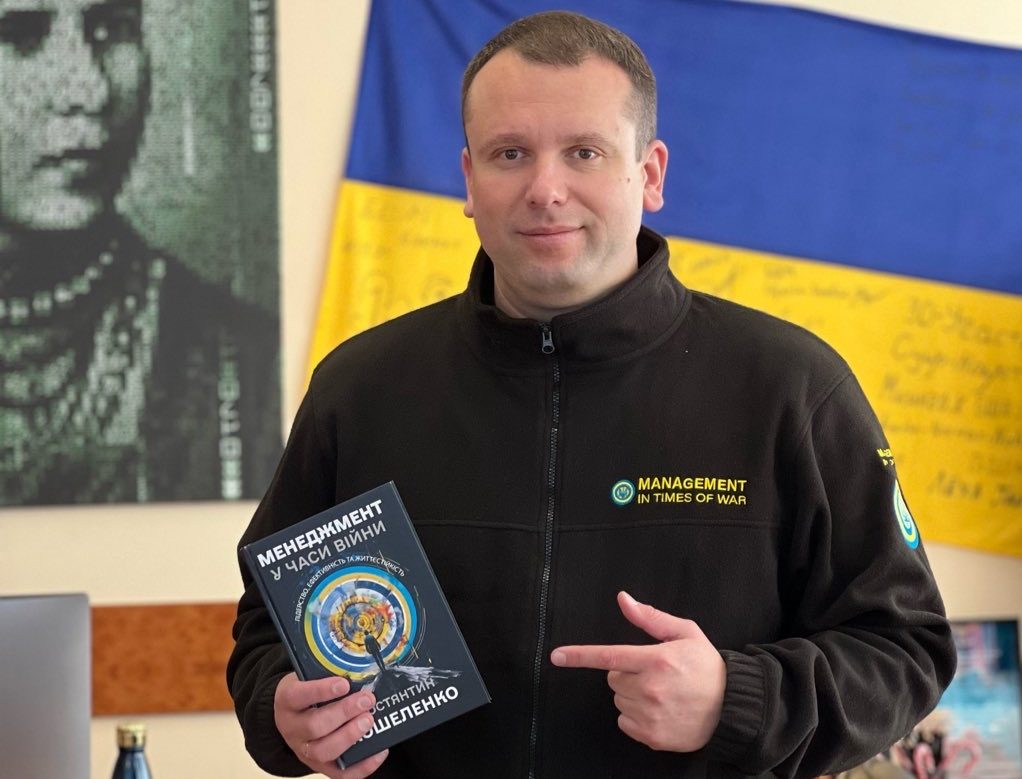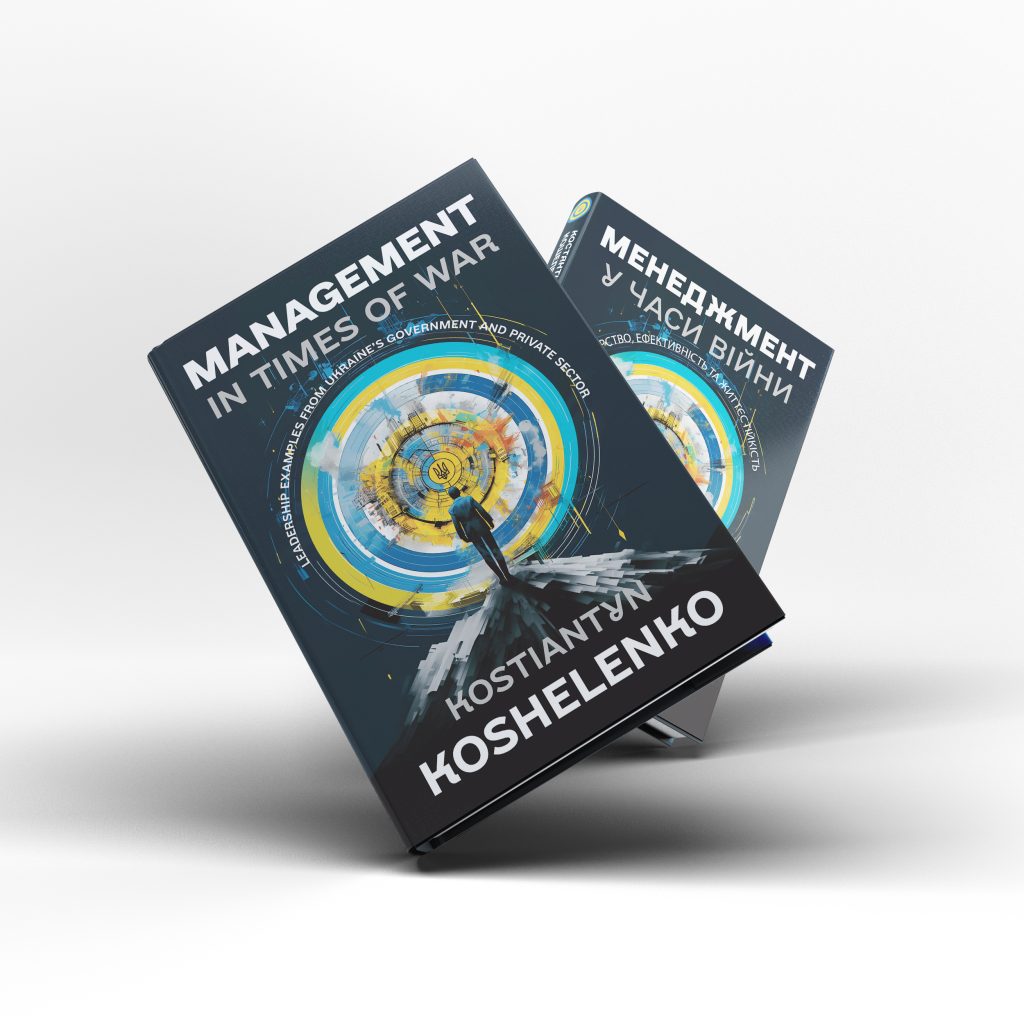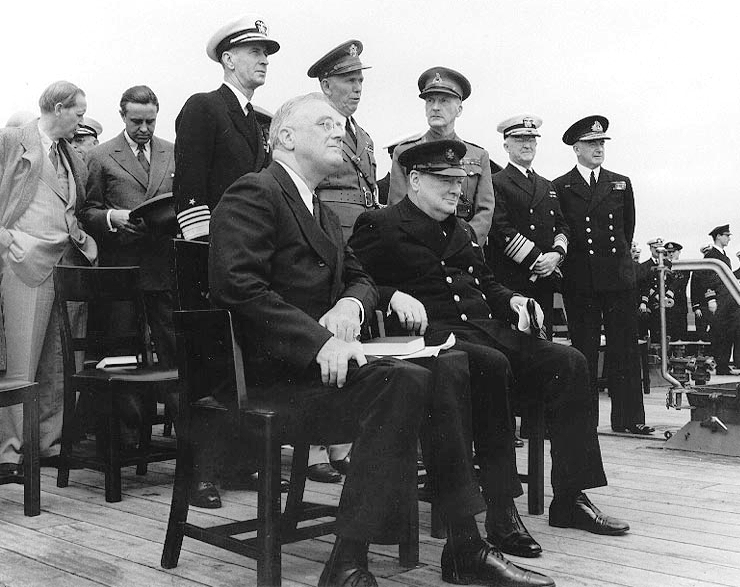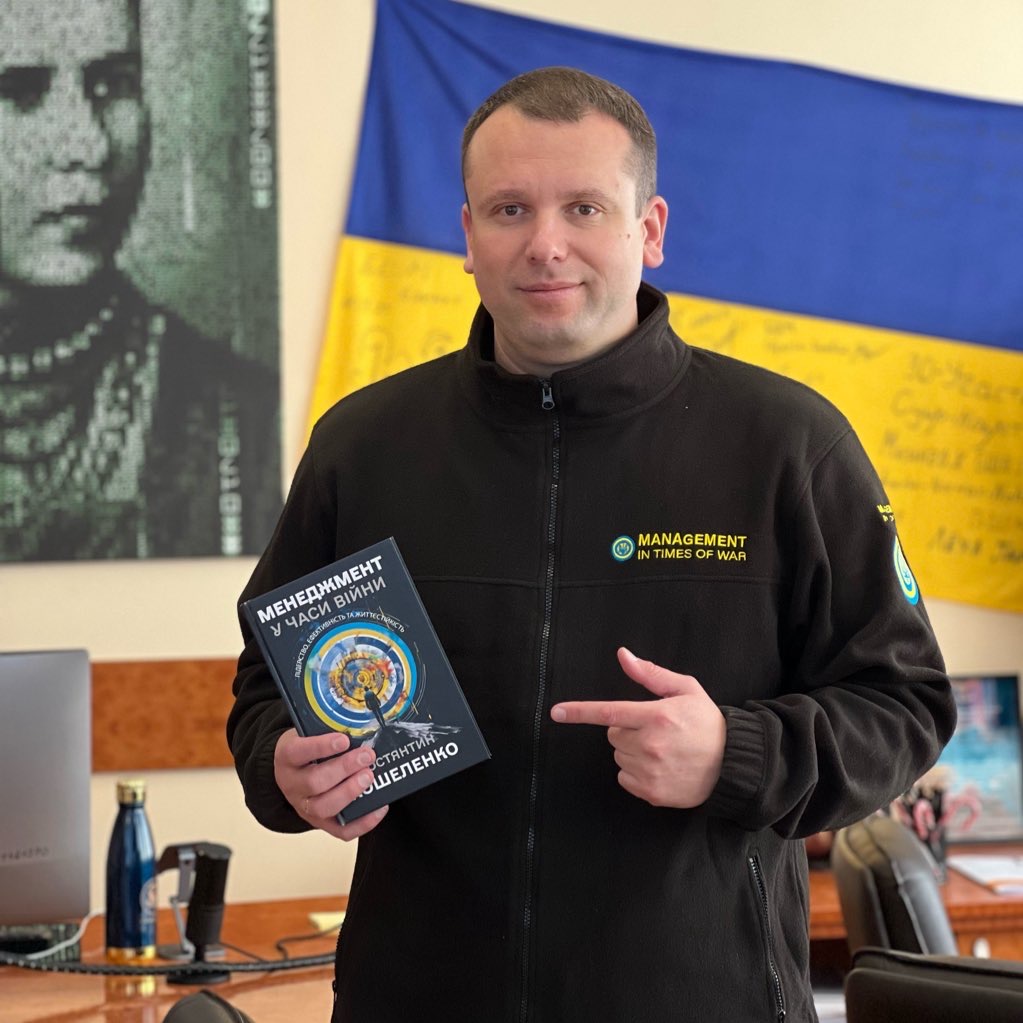
Image: Kostiantyn Koshelenko
In the context of war, economy, state bodies, culture, and social relations are especially interesting topics. “The war is a test for these,” says Kostiantyn Koshelenko in his new book “Management in Times of War.” Mr. Koshelenko is a Deputy Minister of Social Policy of Ukraine, responsible for issues of digital development, digital transformations, and digitalization. The book is a collection of tools and ideas on maintaining productivity, team development, and commitment to one’s values in an environment where chaos is becoming the new norm. The History Avenue exclusively talked about management during times of conflict, effective leadership, and Ukraine’s experiences from historical and contemporary points of view.
Management in Times of War: Innovations Amidst the Challenges of War
The war represents a challenge and requires a daily commitment to improving efficiency, team coordination, and project management. “Management in Times of War” was deeply influenced by that commitment…
THA: What inspired you to write this book? How does effective management play a crucial role in navigating challenges during times of conflict?
Kostiantyn Koshelenko: The journey to writing “Management in Times of War” was deeply influenced by the daily commitment to improving efficiency, team coordination, and project management amidst the challenges of war. This commitment illuminated the idea of documenting reflections and learnings. The book encapsulates the solidarity and unity displayed by Ukraine and global supporters of freedom and democracy, featuring contributions from 40 managers within Ukraine and from 12 other countries to illustrate a rich tapestry of unity in diversity. It reflects on Ukraine’s ongoing struggle and resilience, highlighting the nation’s efforts in rebuilding and innovating with modern digital solutions. This endeavor aims to share these innovations with the world, building a bridge of knowledge and experience among managers globally, fostering a community eager to learn from Ukraine’s experience, and contributing to a collective repository of wisdom on navigating management challenges in times of conflict.

Effective Management: Winston Churchill and Henry Ford
Winston Churchill’s strategic collaboration with military and government officials and Henry Ford’s private sector leadership are two moments highlighting effective management during wartime, says Mr. Koshelenko.
THA: Reflecting on historical events, can you identify a specific moment that highlighted the importance of effective management during wartime?
Kostiantyn Koshelenko: One pivotal moment highlighting effective management during wartime is Winston Churchill’s leadership during World War II. His ability to inspire and mobilize the British public, alongside strategic decision-making in collaboration with military and government officials, underscored the critical role of strong leadership in navigating the challenges of war. Churchill’s adept communication and steadfast resolve played a key role in bolstering British resilience and determination, demonstrating how crucial effective management is in steering a nation through the uncertainties and adversities of wartime.
Another notable example of effective private company leadership during wartime is Henry Ford’s role in World War II. Ford Motor Company’s Willow Run plant was a testament to efficient management and production, as it became the largest bomber manufacturing facility in the world. Under Henry Ford’s leadership, the plant mastered the mass production of aircraft, significantly contributing to the Allied forces’ air power. This showcases how private sector leadership and innovation can profoundly impact wartime efforts through effective management and the mobilization of civilian resources. Ford Motor Company’s conversion to produce B-24 Liberator bombers is an example of private sector leadership and innovation contributing significantly to the war effort.
THA: Could you draw comparisons between historical instances and contemporary scenarios regarding leadership during times of conflict?
Kostiantyn Koshelenko: When we examine historical examples of leadership during times of conflict, we observe that great leaders of the past, such as Winston Churchill or Franklin D. Roosevelt, could guide their nations through the darkest of times with unwavering belief in victory, the capacity to mobilize resources, and the power to inspire their fellow citizens towards collective efforts. Interestingly, contemporary scenarios, especially during Russia’s invasion of Ukraine, display similar trends in leadership.
In the modern context, effective leadership during conflict requires adaptability, accountability, and the use of digital technologies for coordination and communication. Digital transformation enables leaders to engage citizens, coordinate humanitarian efforts, and ensure the continuity of governance and services. This underscores the importance of adapting to new challenges and employing innovative approaches to leadership.

My book, “Management in Times of War,” delves into these aspects, analyzing how contemporary leaders can leverage lessons from the past for effective team, project, and business management under difficult conditions. One of the key lessons is that leadership in a crisis demands not just strategic vision and courage but also empathy, the ability to make rapid decisions, and the skill to integrate digital tools into management processes. This not only effectively addresses immediate problems but also inspires others towards collective achievements and resilience in the face of the most challenging circumstances.
Effective Governance Affects Defense Efforts
Effective wartime management affects the defense efforts, too. Mr. Koshelenko highlights some examples from history.
THA: Similarly, considering historical events, how did effective leadership during wartime influence a nation’s defense? Are there any captivating examples you’d like to highlight?
Kostiantyn Koshelenko: An illustrative example of civilian leadership impacting national defense during wartime is the role of U.S. President Franklin D. Roosevelt during World War II. Roosevelt’s leadership extended beyond military strategy to include rallying national morale and managing the home front. His ability to mobilize the American economy and workforce for war production, through initiatives like the War Production Board, significantly bolstered the U.S. and Allied military capabilities. This comprehensive approach to wartime leadership underlines the critical impact of effective civilian governance and resource management in supporting and sustaining national defense efforts during periods of conflict.
Adding to the example of effective civilian leadership during World War II, the Lend-Lease Act was a pivotal piece of legislation that allowed the U.S. to supply Allied nations with vital war materials. This act exemplifies state-private partnerships, as American industries were mobilized to support the war effort, showcasing how private companies made a difference. Companies like Ford and General Motors shifted from producing consumer goods to manufacturing military vehicles and aircraft, illustrating the significant role of civilian leadership and private sector collaboration in bolstering national defense during wartime.

THA: Transitioning to the present. Considering the current state of your country being at war, do you believe that skillful leadership has the potential to positively influence its economy amid turmoil?
Kostiantyn Koshelenko: In the current context of Ukraine’s resilience against an unprovoked attack, skillful leadership is not only vital but transformative. Despite facing a significantly larger adversary with extensive resources, Ukraine’s steadfast stand and technological advancements underscore the power of effective leadership. The Ministry of Social Policy’s work on enhancing societal resilience through transparent, accessible, and efficient digital systems exemplifies how leadership can drive innovation and maintain economic stability amidst turmoil. This proactive approach contributes significantly to not just surviving but thriving in adversity, showcasing the potential of adept leadership to positively influence a nation’s economy and societal well-being during times of conflict.
War: Rethinking of Management and Leadership
When full-scale war began it was obvious the challenges Ukraine faced required the rethinking of management and leadership. The idea for the book was born…
THA: In your view, which facets of effective leadership are most vulnerable during wartime?
Kostiantyn Koshelenko: In wartime, the facets of effective leadership that become most vulnerable are decisiveness, communication, and emotional resilience. Leaders must make quick, high-stakes decisions with limited information, risking significant consequences. Communication challenges arise from the need to maintain morale and unity under extreme stress, while misinformation can easily spread. Emotional resilience is tested as leaders navigate the personal and collective trauma of conflict, striving to inspire hope and courage amidst despair. These vulnerabilities require leaders to adapt, displaying unwavering strength, clarity, and empathy to guide their teams and nations through crisis.
When full-scale war began, the lives of most of us were turned upside down, and we faced the greatest challenge of our lives. The public and private sectors were transforming before our eyes, reacting to threats both reactively and proactively. Teams and organizational leaders implemented rapid response plans, ensured operations under shelling or evacuation, restored destroyed facilities and processes and built entirely new ones. My role as the Deputy Minister of Social Policy of Ukraine for digital transformation also took on new meaning. In addition to the main task of ensuring the uninterrupted operation of digital social support systems, our team, together with international partners, began to implement humanitarian response programs and continued to push forward progress, creating new and new digital systems and services for citizens. Services that, in wartime, provided not only convenience and efficiency but also safety to people who could use them remotely from a smartphone, without moving around restless cities and standing in lines.

It was during this period that I realized that the challenges we face require not only an immediate reaction but a rethinking of management and leadership. Thus, the idea for the book was born, but I only began writing “Management in Times of War” in the summer of 2023. At that moment, it was clear that we were participating in a sprint, not a marathon, and self-analysis, resilience, and working with people require greater efficiency than ever before.
This book is not a collection of advice. It is a reflection of my observations and conclusions about how management principles transform under the pressure of war. It includes stories of success and trials, stories about adaptation to rapidly changing circumstances, the importance of flexibility, and innovation, and the necessity of preserving humanity in the most difficult conditions.
To provide a broad examination of the topic, I engaged 40 practicing manager-contributors from Ukraine and 12 countries around the world to work on the book, who shared their experience in crisis management. These are leaders who work in very different fields – IT, banking, investment and insurance law, logistics, auditing, energy, arms trade, teaching, and consulting.
THA: Reflecting on Ukraine’s experiences, what lessons do you believe are paramount regarding successful leadership in wartime?
Kostiantyn Koshelenko: Drawing from Ukraine’s experience and my analysis, key lessons for wartime leadership include adaptability, maintaining core values, effective communication, and leveraging technology. Flexibility is crucial for navigating uncertainty and ensuring operational sustainability. A clear vision and steadfast values guide and unite teams even in chaos. Communicating this vision and motivating people towards collective action is essential. Lastly, integrating digital strategies enhances coordination and continuity. These insights, based on collective wisdom from various sectors, underline the essence of resilient leadership in times of war. But it’s better to read about this in the book, where examples and mentions of events in Kyiv and Ukraine are provided.
The products featured in this article are included based on editorial relevance, and no payment or sponsorship was involved in their placement.
One thought on “Management in Times of War: Lessons from History to the Frontlines of Ukraine – A Conversation with Kostiantyn Koshelenko”